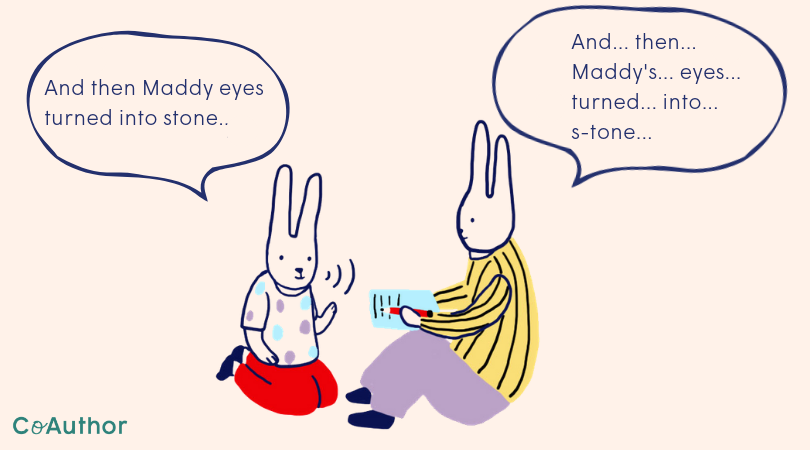By Marwa Abdelfattah, Founder and CEO of CoAuthor

You might think that writing down children’s words for them made them dependent on me. Actually, the result was quite the opposite. I became the children’s extended hand, a means for a story to be born and stay alive. Let me tell you briefly why “coauthoring” is magical:
1) Children feel respected and taken seriously:
Children feel incredibly appreciated and taken seriously when we (adults they trust) write down their spoken words in front of them. It is a way of telling them that their words are important to us and that we love and respect them. It is a way of listening to them with our ears and our hands. The bond that forms over this process is precious! We should all give it a go.
2. They start thinking of themselves as interesting individuals with interesting ideas
Beyond the emotional bond that forms over this process of writing down a child’s words on a piece of paper is another magical element. By witnessing us use our bodies and intellect to document their words, children start developing a self-concept. They start thinking of themselves as interesting individuals who have interesting ideas to share with the world. This strengthens their self-confidence and unleashes their creativity.
3. They see their speech translated into text and start looking at themselves as creators
When we write down children’s words and they see it, we make children’s thinking visible to them, to us and to others. When children see their spoken words magically turn into a text that has an audience (starting with YOU, a super engaged and interested audience), they see before their eyes how they have become authors, creators of something that did not exist minutes ago! This makes them want to create even more.
4. Children learn how to write by watching adults handwrite
No kidding, every single time I wrote down children’s stories in front of them, they would snatch the pen out of my hand and they would start “pretend writing” long paragraphs (which is different than when they try to draw their name or just one word).
Children like to imitate our adult habits! Handwriting in front of a child is a wonderful way to make them LOVE writing. For the sake of context, I would tweak Lev Vygotsky’s famous quote “children grow in the intellectual life of those around them” to “children grow in the intellectual habits of those around them.”
5. They understand that the purpose of literacy is communication
By going through this fun activity that requires imagining, talking, writing and reading, we communicate clearly to children the purpose of literacy: communication. They start looking at the acts of reading and writing as necessary tools to convey important ideas to an audience.
We all learn better when we can use our learning to lead better lives, when we understand through real-life context the purpose of the subjects we study.
6. Children borrow advanced language from us
By reflecting verbally on what the child has said, we are giving them a chance to hear the words again while they see them being reproduced in writing. When we extend children’s language or reflect it using more ‘adult’ ways to express an idea, we are offering them a chance to ‘borrow’ our language skills and become better communicators.
For example, in the illustration above, the adult changed Maddy to Maddy’s, gently offering the child important information about the construction of the possessive.
Be confident and try this out, only good things will come out of it. We created CoAuthor to help you write your child’s stories and ideas in a fun, bonding and educational way. Sign up for beta to start coauthoring right when we launch!
